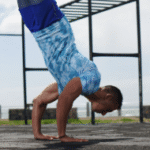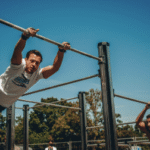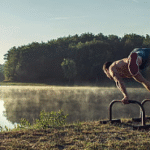Using Private Sessions to Prepare for Calisthenics Competitions: Your Strategic Blueprint
You’ve moved beyond the basics. You have a solid foundation of strength and a passion for calisthenics. Now, you’re ready to test your skills on a competitive stage. Whether you’re aiming for a local Houston event or a national qualifier, the preparation required to succeed in competition is a world apart from regular training. This is where private coaching becomes your most critical asset.
A generic program builds a foundation; a private coach forges a competitor. They provide the strategic insight, technical refinement, and personalized plan needed to transform your skills into a winning routine. This guide details how one-on-one sessions are used to prepare you for the demands of calisthenics competitions.
Phase 1: The Strategic Game Plan – Deconstructing the Competition
The very first sessions with your coach won’t be about just training harder; they will be about training smarter. The focus is on strategy.
Competition Analysis: Your coach will help you analyze the specific competition you’re targeting. Different events have different formats and judging criteria.
Freestyle Competitions: These are the most common, often judged on Statics (holds like planche, front lever), Dynamics (explosive moves like 360s, shrimp flips), and Combinations (the flow and creativity of your routine).
Strength & Endurance Competitions: These are based on max reps (e.g., max muscle-ups, weighted pull-ups) or completing a set circuit for time.
Athlete Assessment: The coach will perform a deep-dive assessment of your current abilities, not just your strengths, but, more importantly, your weaknesses in the context of the judging criteria.
Goal Setting: Together, you will create a realistic, time-based game plan. This includes selecting your “money-maker” skills—the high-scoring moves that will form the core of your routine—and identifying the lower-scoring skills to perfect for transitions.
Phase 2: Skill Mastery and Technical Refinement
Once the strategy is set, the focus shifts to perfecting your arsenal of moves. This is where a coach’s external eye is invaluable.
Perfecting Form: In competition, a clean front lever held for 3 seconds scores higher than a sloppy one held for 5. Your coach will be meticulous about your form, correcting every bent arm, piked hip, and pointed toe. They will use video analysis to break down your movements frame by frame.
Building Skill-Specific Endurance: It’s one thing to hold a planche for 5 seconds when you’re fresh. It’s another to hold it 90 seconds into a high-energy routine. Your coach will program specific endurance protocols, like cluster sets and isometric holds under fatigue, to ensure your skills are solid even when you’re tired.
Unlocking New Skills: Your coach will provide the safest and most efficient progressions to learn new, higher-scoring skills that will set you apart from the competition.
Phase 3: Routine Choreography and Execution
Having the skills is only half the battle. A competition is a performance.
Creating Combinations: Your coach will help you choreograph your routine, linking your skills together in a way that is both impressive and energy-efficient. They will help you create seamless transitions that flow from one move to the next, which is a key scoring component.
Music and Timing: For freestyle events, the routine must sync with music. A coach will help you time your power moves to the beat drops and structure your holds during the lulls, creating a more impactful performance.
Simulated Competition Runs: In the weeks leading up to the event, your sessions will involve full, timed run-throughs of your routine. This builds the specific endurance needed and helps you manage your energy and adrenaline. Your coach will act as a judge, giving you feedback on each run.
Phase 4: Mental and Physical Peaking
The final stage of preparation is about ensuring you arrive on competition day at your absolute peak.
Periodization and Deloading: A coach will structure your training program to peak at the right time. This involves a final, intense training block followed by a “deload” week just before the competition. This strategic reduction in volume allows your body and nervous system to fully recover, ensuring you are 100% fresh and strong on the day.
Mental Rehearsal: You will practice visualization techniques, mentally running through your routine perfectly. This builds confidence and reduces performance anxiety.
Strategy for the Day: The coach will help you plan your warm-up, your nutrition, and your mindset for competition day, leaving nothing to chance.
Finding a Competition Coach in Houston
While many trainers can teach basic calisthenics, preparing for competition requires a specialist.
Look for Proven Experience: Seek out coaches who have competed themselves or have a track record of training competitive athletes.
Visit Specialized Gyms: Facilities like Mekanix Houston and Calisthenics Club Houston are hubs for the competitive scene and have coaches with the right expertise.
Analyze Their Athletes: Look at the performance and form of a coach’s other athletes. This is the best indicator of their coaching quality.
Conclusion:
Using private sessions to prepare for a calisthenics competition is an investment in strategic excellence. It transforms your training from a simple pursuit of strength into a calculated and artful preparation for performance. A coach provides the objective feedback, technical expertise, and strategic planning needed to step onto the stage not just to participate, but with a genuine chance to win.

Using Private Sessions to Prepare for Calisthenics Competitions: Your Strategic Blueprint
Route
Calisthenics Gym Houston Functional Bodyweight Training
Secondary phone: (346) 483-3195
Email: info@calisthenicsclubhouston.com
URL: https://calisthenicsclubhouston.com/
Monday 6:00 AM - 7:00 PM Tuesday 6:00 AM - 7:00 PM Wednesday 6:00 AM - 7:00 PM Thursday 6:00 AM - 7:00 PM Friday 12:00 PM - 6:30 PM Open now Saturday 9:45 AM - 12:00 PM Sunday 3:00 PM - 5:00 PM





